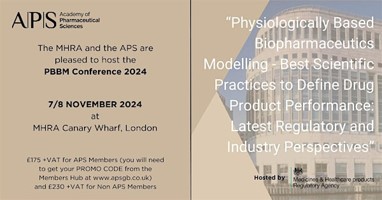The recent PBBM conference in London, jointly organised by APS and MHRA hosted around 70 representatives from regulatory agencies (FDA, EMA, MHRA), pharmaceutical industry, consultants and SME’s. This event followed an earlier Workshop held at M-CERSI in August 2023 (PBBM Workshop for Drug Product Quality). The goal of the PBBM conference was to bring together industry and regulatory agencies and to continue the dialogue around how the use of Physiologically Based Biopharmaceutics Modelling (PBBM) could be developed further. The meeting was designed to deliver training to those new to PBBM and to expand on the case studies submitted for the 2023 M-CERSI workshop by providing insights from the model developer’s perspective. The discussions focused on how PBBM could be used across the product life-cycle with presentations sharing data on case studies from early to late-stage development. Breakout sessions were a particularly noteworthy feature of this meeting and in addition to those which focused on the model development process for the industrial case studies submitted to the M-CERSI meeting, the afternoon of the second day was dedicated to how PBBM could be used to support the concept of dissolution safe space. Across the two days, presentations from industry were combined with views from regulatory agencies and sought to explore the regulatory application of PBBM including expectations for model reports, templates and data quality.
The challenge for PBBM was set out by Xavier Pepin (AVP Regulatory Affairs, Simulations-Plus) who reflected that whilst submissions containing PBBM continue to grow, the success rate is less than optimal with around 2/3 rejected. However, the success cases highlight that, when a model is appropriately developed, validated and the context of use is clearly defined, PBBM can be very impactful in supporting product specifications and design of clinical studies to define product performance in patients.
Across the two days, presentations provided insights from modellers and teams with experience in developing models for regulatory applications and the importance attached to the design of a biopredictive dissolution method and how these data were used in the model to define drug product performance. Regulatory agency presentations including MHRA, EMA and FDA, discussed where PBBM sits in the Model-Informed Drug Development framework and the experience of the agencies in handling submissions which contained PBBM datasets. It is clear that activity in this area is on an upward trend and there is a plan to bring further focus to harmonization in this area through the availability of a PBBM report template (a publication on this is planned in late 2024) and there is progress with a proposal to include a new ICH topic on PBBM at the next ICH assembly meeting. The APS organizing team is planning to write-up the meeting report and publish it in early 2025 so that the discussions and key questions raised over the two days are available for the wider community involved in progressing regulatory applications of PBBM and the November APS-MHRA meeting becomes another important step forward in the pathway for global progress with PBBM.
If you are interested in exploring PBBM or biopredictive method development for your compound or project, then get in touch with the biopharmaceutics experts at Biowaived who will be happy to discuss your needs in detail!
